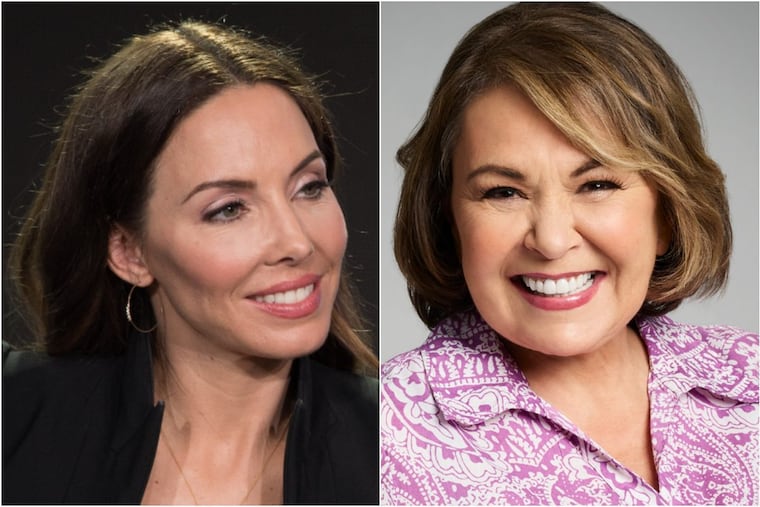'Roseanne' & Whitney Cummings: How the Penn grad helped bring ABC's long-ago hit back to TV
"I thought it'd be interesting to participate in something where I didn't agree with every point of view," said the comedian co-running the return of "Roseanne," which will address the country's political divide.

Whitney Cummings was 6 when Roseanne hit the airwaves in 1988, but the actress, writer, and comedian has long been a fan of the show and its outspoken star, Roseanne Barr.
And as ABC's once top-rated comedy returns in back-to-back episodes at 8 p.m. Tuesday after a nearly 21-year absence, Cummings, who earned her degree in communications from the University of Pennsylvania's Annenberg school, finds herself on the inside, working as one of the reboot's executive producers.
"I've never been married with three kids before, but in terms of her bravery and her honesty and her authenticity, I've always strived to have" what Barr had and brought to TV as Roseanne Conner, Cummings said, talking to a few reporters after an ABC news conference in January. "She always inspired me to tell the truth, no matter how ugly it is, and how offensive it might be, and how uncomfortable it might make people."
>> Read more: Roseanne reappears and This Is Us flashes forward
Although there is a new generation of Conners — grandchildren played by Emma Kenney, Ames McNamara, and Jayden Rey — one of the selling points of the new version has been how much of it's not new, from the lookalike living room couch to original cast members Barr, John Goodman, Laurie Metcalf, Sara Gilbert (now also an executive producer), Lecy Goranson, Sarah Chalke (the second Becky, now in a different role), and Michael Fishman.
So how did Cummings, cocreator of 2 Broke Girls and the star and creator of Whitney, end up co-running the show with Roseanne veteran Bruce Helford?
"I was working with [Roseanne executive producer] Tom Werner on something, and between every take, I'd ask him for Roseanne stories, because I was like so sort of obsessed with the behind the scenes, and how these decisions got made," Cummings said.
It felt to her like "a good time for that show to come back, when the election was happening, and the working class was clearly not being heard or represented on network television – and they spoke, and they spoke loudly," she said. "I think that if a new show, with a family we had never met before, all of a sudden came on and then tried to address this sort of stuff, it might feel exploitative, it might have felt opportunistic, or inauthentic."
So when Werner "called me and he said, 'We're doing this. Do you want to be a part of it?' … I canceled everything I had going on and made myself available, if anything just to go in and learn from these writers."
The learning didn't stop with the writers' room. With a title character who's at odds with her sister, Jackie (Metcalf) over the 2016 election — Roseanne Conner, like Roseanne Barr, supports President Trump — Cummings said it was necessary that she hear other people's voices.
"I felt like I was in an echo chamber after this happened [the election]. I surround myself with people who agree with me, I follow people on Twitter who agree with me, people who agree with me follow me, and I'm sort of only seeing my point of view. And I realized one day I was sort of tweeting out my thoughts, and everyone was tweeting back, and retweeting, and, 'Yeah, yeah,' and no one was disagreeing with me. And that can't be good," she said. "So I thought it'd be interesting to participate in something where I didn't agree with every point of view."
Inside the writers room, "there is vigorous debate. There's a lot of, what would this person say? How would they say it? How do I put my agenda aside and honestly depict this person without criticism or judgment – or superiority? And how would they talk and how would they dress and … this part of the country, that we like to pretend doesn't exist, that we have so much vitriol for, how do we handle that with authenticity and compassion, instead of negativity and judgment?" said Cummings.
Given that Barr herself hasn't been truly working class for decades and that her character was in many ways a progressive, how will the show address what might seem to some like a major shift in Roseanne Conner's politics?
"I think that we basically tried to track the evolution of our economy, and our culture, and our declining health-care availability, and what the working class is actually going through," Cummings said. "We tried to figure out where would Roseanne Conner be today, given all these circumstances. We did focus groups, we all spent lots of time with people [of differing views], and we tried to figure out exactly where she would be."
And they listened, of course, to Barr, who's also an executive producer (and credited, finally, as the show's creator). Her circumstances may have changed, Cummings said, but "her instincts about Roseanne Conner are still very much alive."
Roseanne. 8 p.m. Tuesday, ABC.